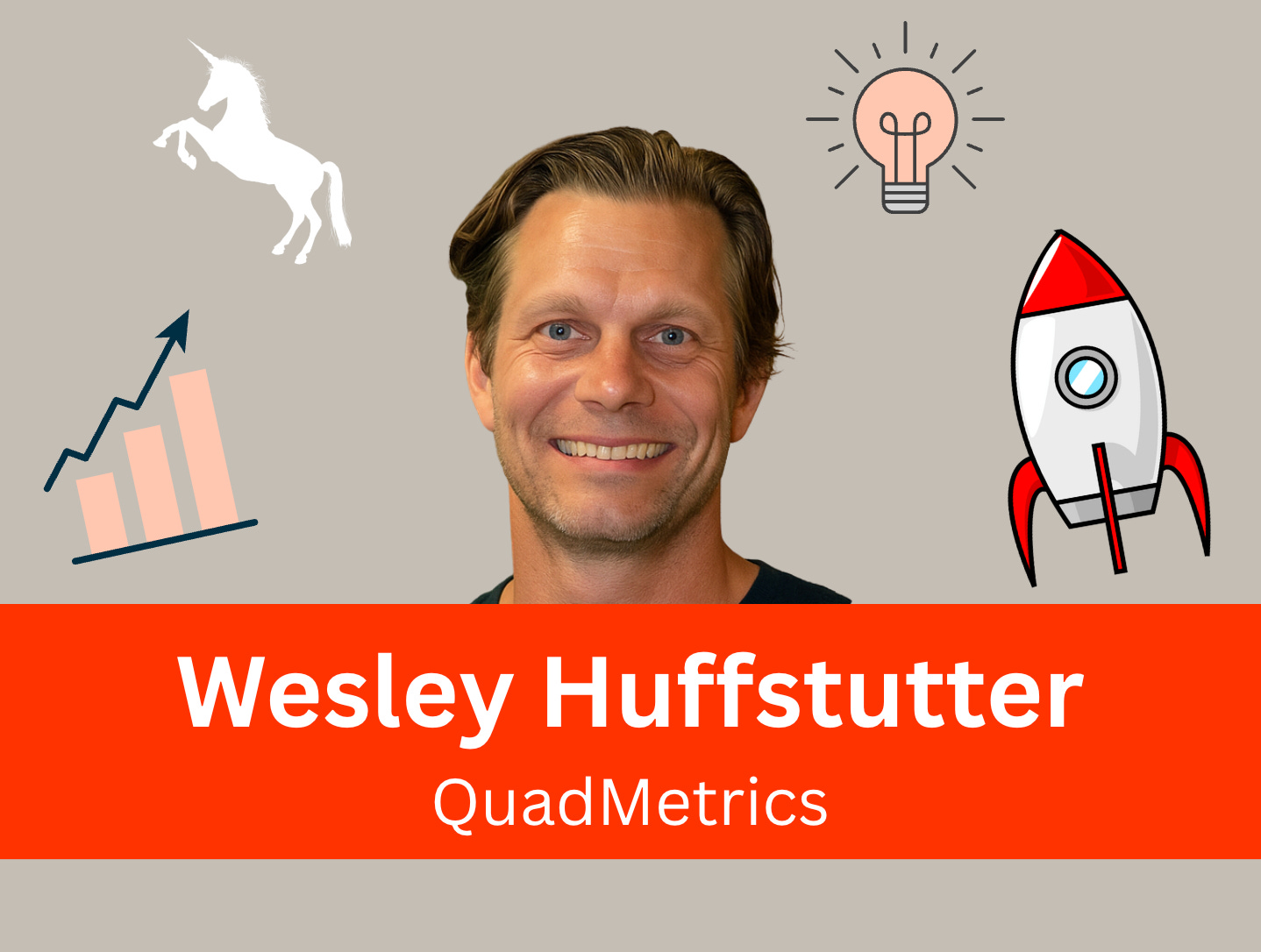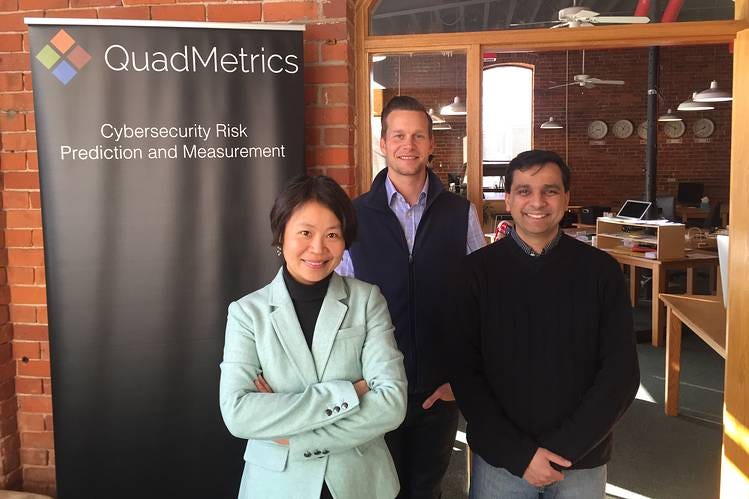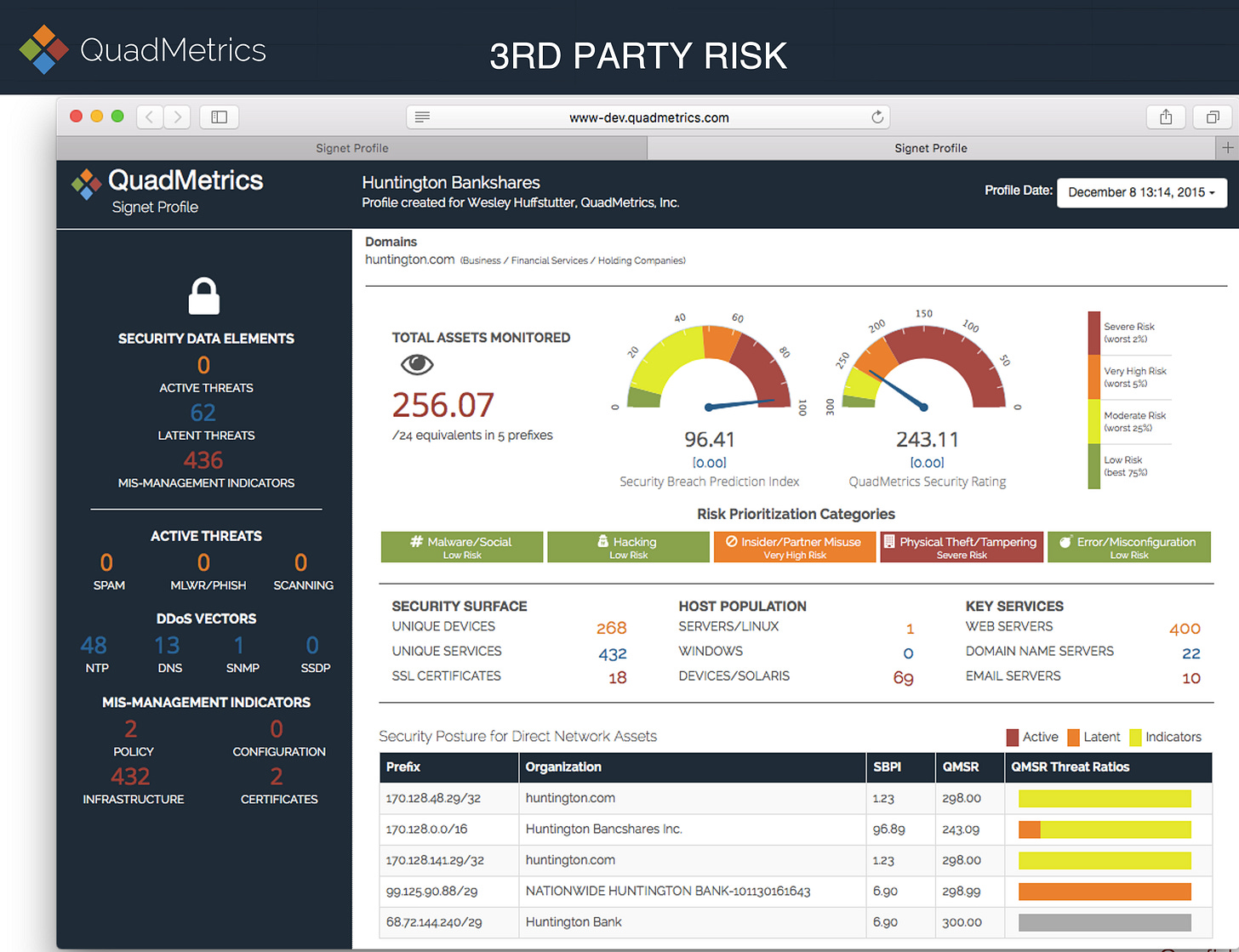The journey from University spinout to exit
How QuadMetrics went from an academic idea to a sale in less than 15 months.
👋 Welcome to Valley of Doubt, a free weekly newsletter that goes deep into founder stories from the early days of startups. 🚀
Wesley Huffstutter founded and sold QuadMetrics, a cybersecurity risk startup spun out of the University of Michigan. He was also the co-founder and CEO of SecuritySnares, a cyber startup focused on defeating the scourge of ransomware. He now spends his days in Queensland, Australia, as an Entrepreneur in Residence (EIR) for several innovation programs.
In this interview, we dive into:
How most founders live off minimum wages while they build their business
Negotiating an exit with a large acquirer after just 18 months
The importance of transparency with staff
Choosing between startup life and a stable job
The impact of the entrepreneurial journey on those close to you
SH
Tell me a little about Wesley Huffstutter. What’s the 30 second short story?
WH
I'm a startup guy. Trying to figure out what value there is in a product and how to take it to market. Those are the puzzles I enjoy solving. Guiding startups through those early motions with new products and new services. I enjoy solving business model problems, so I guess that's me in the smallest of nutshells.
SH
How did you get into startups?
WH
I graduated with a degree in computer science, and my first job out of uni was writing AI software. As one of the more extroverted engineers, I ended up leading marketing for a startup. I wasn't the founder - I think I was the 12th employee or something around that mark. I joined after they had already lost some people because the company had moved from New Mexico to Austin, Texas. I joined them in Austin, and they had just closed one million in angel money.
That was my first startup experience, and I guess I never left. The company eventually sold to a public company during the dot-com crash. They had raised 20 million in venture capital and then received an acquisition offer. At the time the board thought the better option was going public, but then the market for companies to go public fell through the floor. In the end they accepted an offer from the same acquirer for a lot less. But at the time, being acquired for money was a real feat in itself.
SH
Did you make anything out of it personally?
WH
No, I didn’t make anything out of it. It was one of those situations, unfortunately, where it didn't trickle down to the common shares.
When Academics Meet Reality: The Art of Spinning Out
SH
I know you spent the next few years working in startups that were created via a University commercialisation process. Helping academics take their ideas and spinning them out into companies?
WH
Yeah my job was to help start companies.
I was mostly doing startup consulting until my partner, who is a professor, was offered a position at the University of Michigan. Someone who knew me as a startup consultant suggested I should talk to the commercialisation office at the same uni, because unlike most commercialisation offices at the time they had a separate group that focused on startups. It was highly unusual, and Michigan University was very forward-thinking at the time. I ended up working there for about a decade, helping faculty start companies based on research.
I ended up spinning out with QuadMetrics as co-founder and CEO. The great part of that is that it was sold to a public company pretty quickly. From founding to closing the acquisition was 15 months. I'd be naive to say serendipity doesn't play a role in these things, but I think we had a good strategy.
At the time we exited I was making minimum wage, and the only reason my co-founder and I were making minimum wage is because we had a federal grant. We didn't want to lose it by breaking federal minimum wage laws, so we gave ourselves the minimum requirement.
Brought to you by Murmar.
SH
What was the idea that you decided to go all in on?
WH
The company was called QuadMetrics. We used internet scale data and machine learning to do predictive cyber risk analytics of networks. We monitored signals from open source and proprietary data sources to provide an overall security score for an enterprise and to understand a firm's security risk. We could determine the probability of any organisation in the world being breached in the next 12 months, with a prediction accuracy greater than 90%.
The company was essentially creating "credit scores" for cybersecurity risk, helping organisations and insurers better understand and quantify cyber risk.
SH
What was the spinout process like? Would you do the same deal today?
WH
Absolutely I would do the same deal. The deal was very good and fair.
We took certain steps to ensure the deal was structured the way we wanted. A couple of the co-founders gave up their entitled portion of the University’s take to make everyone comfortable.
You know the University of Michigan office knows what they're doing. Their goal is to get it out where it does good. They're looking for fair value, but they're not trying to pull every penny off the table. They are really reasonable. It wasn’t a hard deal to do.
The dirty secret in research commercialisation, especially when it comes to startups, is that very few, if any, licenses survive the first year without renegotiation. You try to get it right the first time, but when you start selling or engaging with the customer, things change.
From a university perspective, what they don't want to do is kill the company. So the deal was good and they were completely reasonable.
Riding the Startup Rollercoaster: When Highs Meet Lows
SH
Was there a time during QuadMetrics that you thought, “Holy shit - this might actually work!”
WH
It comes and goes all the time. That's the roller coaster. Every time you have a sales call where someone says “this is the best thing since sliced bread”, or you close a deal, or you see the numbers and you just think “this is killer”.
But then you push on and make a few more sales calls, and you realise maybe you don't have as much product-market fit as you thought you did, and that all these sales aren't as repeatable as you'd like. Then you're in the trough of sorrow again, and it just bounces back and forth.
There's a constant emotional rollercoaster that happens all the time. When there's a win the highs are high, but equally the lows can be very low. I tend to be very transparent with my team, and it all stems from my experience at that very first startup I worked at.
We were in our first venture round and we had just raised the money, so the first thing everyone does is go out and have a drink together. We were sitting around talking and I remember Nick, the Head of Accounting saying, “I can't believe everyone's not more excited”.
We asked him what he meant and he said “ I mean we just raised capital! You don't know how close we came to going under”.
He was right, as no one had ever told us. I'm now thinking about every little meaningless request I had made. We need more paper, or get me a new keyboard. It was mundane stuff, but if they had let us know that money was really tight, I might have adjusted accordingly. They should have been more transparent.
I think about that now. When we were at QuadMetrics we would have these meetings with our team where we were very open. We were clear about what we were struggling with. I don’t believe in holding back because sometimes those team members could be the source of a solution or a connection. The highs are high and the lows are low, but it’s easier if everyone is transparent about everything that's going on.
When FICO Came Knocking (And We Said No)
SH
You managed to exit within 18 months of starting, which is astonishingly quick. Tell me about that process.
WH
The acquisition came to us. We didn’t have to chase. The company that acquired us was called the Fair Isaac Corporation. In the US we call it FICO.
It's well known in the US, because in order to get a loan or anything like that, your creditworthiness is based on a FICO score. They came up with the algorithm. And so at the time when we were qualifying security risk, our goal was always to be the FICO score for cybersecurity. But everyone had started making the same claim, that they were the “FICO score for cybersecurity”.
At that point in time, FICO started to look like they were going to move into the cyber risk space as well. When they appeared to be encroaching on our market, we decided to have a conversation with them. We approached them with some interesting research we had and asked for a chance to partner.
In the conversations, I threw out the idea of having FICO invest. I let them know that we were going to raise a round at some point, that we didn’t need the money as we've got revenue, plus we've got money coming in from a grant from the Department of Homeland Security. So if they were interested in investing, we would be happy to chat. They quickly let me know that they don't invest, they only buy. They expected us to ask for permission to call ourselves the FICO score for cybersecurity, like our competitors did. We didn’t.
We left it at that and we moved on and kept running the business. Then just before attending RSA I got an email from FICO with an offer of acquisition. Which we rejected of course! We did have dinner with them at RSA but we let them know their offer was too low. Eventually they came back with a better offer and we accepted.
SH
How many customers did you have when you sold?
WH
I think we had 14 or 15 customers and not much revenue.
SH
Did the exit go smoothly?
WH
Yes. We could not disclose that we were selling, as part of the deal is that you need to keep it confidential during the process. So we couldn’t shop it around to see if we could get a better offer.
There was one VC we were pursuing at the time, but they had clearly figured out who we were in an acquisition process with. By the time we accepted the offer to sell, they were getting ready to invest in our competitor. They called up the corporate development team of FICO to let them know that they were investing in a competitor, to get them to move off the idea of acquiring us. They were going to announce their investment before we intended to make our acquisition public. We didn’t want to appear as followers in the market, so we announced first, causing the VC to delay their investment announcement.
SH
You talked about how important your partner has been to your success. How did starting your company impact your relationships with other people in your life?
WH
A lot. The stress of it is enormous. I've been in startup land for so long, and you know we were talking with the kids about this just last night. We've never assumed that we were going to have a lot of money just because I've been in startups.
When you talk to entrepreneurs, you feel like you don't have the retirement that everyone else has, because you have to plan for long periods of little to no income. You do that for a future payday, but sometimes those paydays don't happen. So yeah it's tough. There are times when I needed to prioritise my partner’s career because it's what's bringing in the income. I recognise that I end up being a bit of a burden, but I guess she has enabled me to do this.
SH
I know founders often live off very low salaries for many years. How much did you pay yourself at QuadMetrics??
WH
It was $24,000 a year, and that was in 2015.
SH
How did you live off that?
WH
I couldn't live off that. I mean the dirty secret is that probably nearly every successful entrepreneur is really either young and living off their parents in the basement, or has a partner who is the reason for them to be able to do this in the first place. For me it was my partner. If it weren't for my partner, Amanda, I wouldn't be able to do any of this.
SH
Was there ever a time you wanted to quit and get a normal job to live the 9-5 life?
WH
I think regular income is always in the back of your mind. And then I have to realise that I'm an entrepreneur. How hireable am I? My skill set is geared for a niche of companies who either can’t afford to pay me, or companies that haven’t even diagnosed that they have a problem.
I think any entrepreneur that says they have never thought about quitting and choosing a salary is lying to you. We all want to get paid for the value we create. I think every entrepreneur has that thought at some point. You do a financial calculation in your head, and just think about that money sitting in an account compounding somewhere. It can make more economic sense not to be an entrepreneur.
SH
Let’s finish off with some fun questions. What’s a book we should all read?
WH
A couple of years ago I read a book called The Qualified Sales Leader. I found it really interesting, and it made me think about how software is sold.
SH
What’s a band or musical act we should all listen to?
WH
I’ve found many Australians haven’t heard of the Dave Matthews Band, so they should give that a listen.
SH
What’s a podcast we should all listen to?
WH
I listen to the Risky Biz podcast because I'm a security guy. I'm also a massive Arsenal fan and so I listen to the Arsecast podcast.
I’ve just started to listen to a contrarian podcast: “Better Online”.
I’m not sure I'm recommending it yet, but it provides a counterpoint to the growth at all cost mantra we get as entrepreneurs.
SH
Thanks so much for your time Wes.





